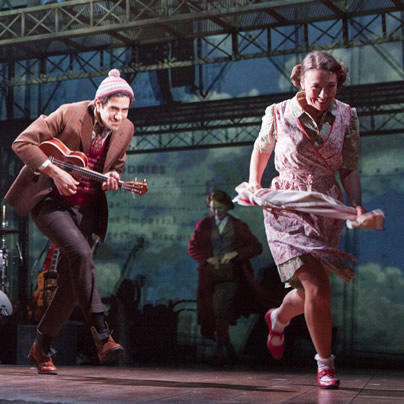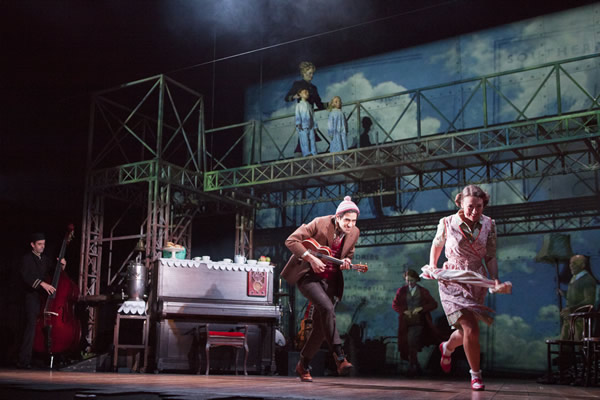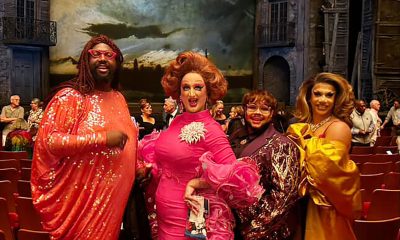Arts & Entertainment
Tone balancing
Screen-to-stage adaptation is multi-media delight


The cast of Kneehigh’s U.S. tour of ‘Brief Encounters’ by Jim Cox. (Photo courtesy STC)
‘Brief Encounter’
Through April 13
Shakespeare Theatre Company
The Lansburgh Theatre
450 7th Street, NW
$30-75
202-547-1122
Conventional wisdom says don’t mess with a classic. Typically the result is a letdown. But there are exceptions. Case in point is the UK-based Kneehigh Theatre’s delightful production of “Brief Encounter,” an adaptation of the same-named 1945 British film.
In bringing the iconic screen romance to the stage, director/playwright Emma Rice blends theater and film incorporating projections, musical numbers and myriad clever touches, all now on display at the Shakespeare Theatre Company’s Lansburgh Theatre.
The David Lean film is based on Noël Coward’s “Still Life,” one of many plays the gay sophisticate wrote and performed with longtime pal Gertrude Lawrence. It follows the short-lived romance of two married people who meet cute at a train station when Alec, a handsome doctor, removes a cinder from housewife Laura’s eye. The pair begin meeting weekly, mostly in the station tearoom or restaurants, and though their feelings are intense, their relationship remains chaste, never going beyond a kiss. And while the inevitable return to their respective respectable lives and practical mates happens as expected, it’s still a painful outcome. Rice’s adaptation draws from the film and the play.
The action kicks off in the Lansburgh lobby with a zippy string quartet of cast members dressed as ‘40s movie theater ushers performing a selection of vintage tunes. Inside, the stage’s usual curtain has been swapped out for one that’s brighter and redder, reminiscent of those found in old movie palaces. There’s a big movie screen that plays black-and-white footage, a nod to the source film and an exploration of the protagonists’ experience. When not on stage, Alec (Jim Sturgeon) and Laura (Hannah Yelland in her Tony-nominated role from when the show ran on Broadway in 2010) can sometimes be found seated amongst the audience; after all, their first date was a trip to the cinema. They also may slip through a slit in the movie screen only to reappear as bigger-than-life projections.
While meeting in public, the pair is reserved. Their muted passion is represented by film of fast moving clouds and raging tides. As the romantic tension mounts, Laura begins to grapple with doing the right thing. It’s she who suggests they part ways.
Director Emma Rice’s precise and inventive staging is wondrous, the cast is superb and her team’s spectacular technical, multi-media design is top notch. Neil Murray’s set is ingeniously serviceable and his period costumes are impeccably drawn. As the besotted but staid lovers, Yelland and Sturgeon play it straight, never mocking the necessarily formal dialogue. But the supporting ensemble has no such restraints. They’re free to camp it up and play for laughs, and they do, expertly. It’s an effective balance.
The tearoom’s other regulars are its manager Myrtle (Annette McLauglin), an amusingly genteel type whose breaks are spent trysting with the amorous station manager Fred (Joe Alessi); and Beryl (Dorothy Atkinson), a cheeky waitress who is dating the cute young station snack seller, Stanley (Damon Daunno). The cast play multiple parts and along with Dave Brown and James Gow, they also sing and play instruments. Songs include Coward’s “Mad About the Boy,” “A Room with a View,” and melodic original music.
The music is put to especially good effect with another Coward song, “Go Slow, Johnny” sung poignantly by Daunno during a key scene in which the Alec and Laura are alone drying off after having fallen out of a rowboat.
Most of the play takes place in the train station. Not surprisingly, there’s a moment when it seems that Laura might throw herself on the tracks and end it all. But no, she’s too sensible for that. Instead, she returns home (two leather club chairs and a big radio) where her patient husband (Alessi, again) and young son and daughter (a pair of life-sized puppets) are waiting.
“Brief Encounter” is part of the really terrific STC Presentation whose mission is to present world class international productions to D.C. audiences. This memorable production is a testament to both the vibrancy of theater and Coward’s enduring genius.

‘A Wrinkle in Time’
Through July 20
Arena Stage
1101 Sixth St., S.W.
Tickets range from $59-$209
Arenastage.org
Currently at Arena Stage, talented out actor and singer Taylor Iman Jones is rekindling an old friendship with an adored character of fiction.
Broadway vet Jones is starring as 13-year-old Meg Murry in “A Wrinkle in Time,” the world-premiere musical adaptation of Madeleine L’Engle’s same-titled book.
For many readers, especially women, the classic 1962 young adult novel, was their first foray into sci-fi, particularly one with a female protagonist.
The story centers on Meg, an awkward schoolgirl whose physicist father has mysteriously disappeared. Now, Meg, her popular friend Calvin, and smart younger brother Charles Wallace are tasked with moving through time and space to find him. Along the way they encounter adventure and evil.
For Jones, 33, playing 13-year-old Meg feels freeing in ways. She says, “As you get older, you’re told to grow up, so I like letting go of some of that. To feel feelings in their rawest form and to tap back into that is fun. I like the spontaneity. There are highs and lows to revisit.”
Born and raised in the San Francisco Bay Area, Jones began piano lessons at just six and soon added band and plays to their pursuits. Following high school, she made a deep dive into California theater for seven years before making the big move to New York in 2017 where after just two months she was singing on Broadway.
The determined and appealing Jones, who lives in New York with their partner, boasts an impressive bio. She has appeared on Broadway as Catherine Parr, Henry VIII’s sixth and final wife in Six, and in the original casts of “Head Over Heels” and “Groundhog Day.” She’s been seen in national tours of “Hamilton” and “American Idiot.”
WASHINGTON BLADE: It seems “A Wrinkle in Time” and Meg mean a lot to a lot of people.
TAYLOR IMAN JONES: The book tells the story of a girl with so much undiscovered power who’s accomplishing things she never imagined that she could.
BLADE: Can you relate?
JONES: Meg wears her emotions on her sleeve. I can certainly relate to that. I’m a Pisces. Sometimes being hyperemotional and very empathetic can feel like a burden, but as I’ve matured, I have realized that it’s not a bad quality. And it’s something I’ve learned to harness and to enjoy. I love that I can play a role like Meg in front of thousands of people.
BLADE: Was “Wrinkle in Time” a book you knew well?
JONES: Oh yeah, it’s a favorite book that lives in my heart and my mind. It’s one of the first books that taught me about the adventure of reading.
BLADE: And playing a favorite character must be a kick.
JONES: It really is.
BLADE: Meg is a big part in a big show.
JONES: This musical is huge. They’re traveling through space and meeting people on different planets. 20-person cast. 30 songs in the show. Quite the undertaking and I’m proud of us. I’m on stage for the entire musical and I sing four or five numbers.
As a mezzo soprano I guess you’d say I have the luxury of being able to do a lot of musicals that span a lot of different genres: rock musical, pop musical, and standards. “A Wrinkle in Time” is contemporary musical theater.
For me, singing is probably the least difficult part of the show. What’s harder for me is the way Meg experiences trauma; I need to be careful when I’m screaming and yelling.
BLADE: It seems mostly women have been involved in making this production happen (book by Lauren Yee; music and lyrics by Heather Christian; directed by Lee Sunday Evans; and choreography by Ani Taj.)
JONES: It’s true, the director, writer, etc., and most of our producers are all women. This doesn’t happen most of the time. For me it means new ideas and fresh energy, and pushing the limits of musical theater.
It’s also created a wonderful space in which to work. It can be more generous, and understanding. And centering the story on a young girl is something we can all relate to.
BLADE: Will “A Wrinkle in Time” resonate with queer theatergoers and their families?
JONES: I think so, especially on the heels of pride month. It’s truly a show for all ages about finding your inner strength and fighting for the things that you love; not letting evil win over the power of good, and not just for yourself but for those around you too.
Movies
Two new documentaries highlight trans history
‘I’m Your Venus’ on Netflix, ‘Enigma’ on HBO/Max

One of the most telling things about queer history is that so much of it has to be gleaned by reading between the lines.
There are the obvious tentpoles: the activism, the politics, the names and accomplishments of key cultural heroes. Without the stories of lived experience behind them, however, these things are mere information; to connect with these facts on a personal level requires relatable everyday detail — and for most of our past, such things could only be discussed in secret.
In recent decades, thanks to increased societal acceptance, there’s been a new sense of academic “legitimacy” bestowed upon the scholarship of queer history, and much has been illuminated that was once kept in the dark. The once-repressed expressions of our queer ancestors now allow us to see our reflections staring back at us through the centuries, and connect us to them in a way that feels personal.
One of the most effective formats for building that connection, naturally enough, is documentary filmmaking — an assertion illustrated by two new docs, each focused on figures whose lives are intertwined with the evolution of modern trans culture.
“I’m Your Venus,” now streaming on Netfllix, bookends an iconic documentary from the past: “Paris is Burning (1990), Jennie Livingston’s seminal portrait of New York City’s ballroom scene of the ‘80s. In that film, a young trans woman named Venus Xtravagana delivered first-person confessionals for the camera that instantly won the hearts of audiences — only for them to break with the shattering revelation that she had been murdered before the film’s completion.
That 1988 murder was never solved, but Venus — whose surname was Pellagatti before she joined the House of Xtravaganza – was never forgotten; four decades later, her family (or rather, families) want some answers, and filmmaker Kimberly Reed follows her biological siblings — Joe, Louie, and John, Jr. — as they connect with her ballroom clan in an effort to bring closure to her loss; with the help of trans advocates, they succeed in getting her murder case re-opened, and work to achieve a posthumous legal name change to honor her memory and solidify her legacy.
It’s a remarkably kind and unapologetically sentimental chronicle of events, especially considering the brutal circumstances of Venus’ killing — a brutal death by strangling, almost certainly perpetrated by a transphobic “john” who left her body hidden under a mattress in a seedy hotel — and her decision to leave her birth family for a chosen one. As to the latter, there are no hard feelings among her blood relatives, who assert — mostly convincingly — that they always accepted her for who she was; one senses that a lot of inner growth has contributed to the Pallagatti clan’s mission, which admittedly sometimes resembles an attempt at making amends. For the murder itself, it’s best to leave that part of the story unspoiled — though it’s fair to say that any answers which may or may not have been found are overshadowed by the spirit of love, dignity, and determination that underscore the search for them, however performative some of it might occasionally feel. Ultimately, Venus is still the star of the show, her authentic and unvarnished truth remaining eloquent despite the passage of more than 40 years.
Perhaps more layered and certainly more provocative, documentarian Zackary Drucker’s “Enigma” (now streaming on HBO/Max) delves further back into trans history, tracing the parallel lives of two women — trans pioneer and activist April Ashley and self-styled European “disco queen” Amanda Lear — whose paths to fame both began in Paris of the 1950s, where they were friends and performers together at Le Carrousel, a notorious-and-popular drag cabaret that attracted the glitterati of Europe.
Ashley (who died at 86 in 2021) was a former merchant seaman from Liverpool whose “underground” success as a drag performer funded a successful gender reassignment surgery and led to a career as a fashion model, as well as her elevation-by-wedding into British high society — though the marriage was annulled after she was publicly outed by a friend, despite her husband’s awareness of her trans identity at the time of their marriage. She went on to become a formidable advocate for trans acceptance, and for environmental organizations like Greenpeace, who would earn an MBE for her efforts, and wrote an autobiography in which she shared candid stories about her experiences and relationships as part of the “exotic” Parisian scene from which she launched her later life.
The other figure profiled by “Enigma” — and possibly the one to which its title most directly refers — is Amanda Lear, who also (“allegedly”) started her rise to fame at Le Carrousel before embarking on a later career that would include fashion modeling, pop stardom, and a long-term friendship with surrealist painter Salvador Dalí. A self-proclaimed “disco queen” whose success in Europe never quite spread to American culture (despite highly public associations with musical icons like David Bowie and Roxy Music), Lear’s trajectory has taken her in a different direction than Ashley’s. In the film’s extensive live interview segments, she repeatedly denies and discredits suggestions of her trans identity, sticking to a long-maintained script in which any and all details of her origins are obscured and denied as a matter of course.
At times, it’s almost amusing to observe her performative (there’s that word again) denials, which occasionally approach a kind of deliberate “camp” absurdity in their adamance, but there’s also a kind of grudging respect that’s inspired by the sheer doggedness with which she insists on controlling the narrative — however misguided it may seem to those of us on the outside. Debate about her gender-at-birth has continued for decades, even predating Ashley’s book, so the movie’s “revelations” are hardly new, nor even particularly controversial — but her insistence on discrediting them provides sharp contrast with the casual candor of Ashley’s elegantly confident persona, underscoring the different responses to transphobia that would direct the separate lives of both these former (alleged) friends.
For what it’s worth, Lear sent an email to the Washington Post, calling the movie “a pathetic piece of trash” and denying not just her trans identity but any friendship or association with Ashley, despite ample photographic and anecdotal evidence to the contrary — and while it might come across as callous or desperate for her to maintain the presumed façade, it’s a powerful testament to the power of cultural bullying to suppress the truth of queer existence; the contrast between the life each of these women chose to live speaks volumes, and makes “Enigma” into one of the most interesting — and truthful — trans documentaries to emerge thus far.
While neither film presents a comprehensive or definitive view of trans experience (is such a thing even possible, really?), both offer a perspective on the past which both honors the truth of queer existence and illustrates the ways in which the stigma imposed by mainstream prejudice can shape our responses to the identity through which we are perceived by the public.
That makes them both worth your attention, especially when our queer history — and the acknowledgement of trans existence itself — is at risk or being rolled right back up into the closet.
Sports
Trans cyclist’s victory sparks outrage in conservative media
Katheryn Phillips is originally from DC

On the heels of UPenn erasing the record of the first openly transgender NCAA Division I All-American swimmer and the U.S. Supreme Court’s decision to tackle bans on trans student-athletes, right wing media is now all hot and bothered about the latest trans woman who won a cycling championship — even though she competed according to the rules.
On Tuesday, 58-year-old Katheryn Phillips finished first in USA Cycling’s Lyons Masters National Championship race for women aged 55-59, with a time of 1:42:10, according to the official results posted by the organization. The record shows her gender as “F” for female.
One second behind Phillips was Julie Peterson, with a time of 1:42:11 — as were three other cyclists: Mary Beth Grier, Andrea Cherniak-Tyson, and Carolyn Maddox.
Peterson, 57, was so outraged, she told Fox News she refused to stand on the podium in second place next to Phillips. Her story was swiftly shared by the New York Post (also owned by Fox’s parent company News Corp.), the Daily Mail, Breitbart, and other conservative media.
Both Peterson and another competitor are accusing USA Cycling of “hiding” that a transgender woman had registered to race.
“It was hidden from us. Katheryn Phillips, KJ’s name, was not on that list. And I checked it up all the way to the point of closure when we couldn’t register online anymore,” Debbie Milne told Fox.
“If I had known, I wouldn’t have spent thousands of dollars in travel and time off work to come and do a race,” Peterson said. Fox welcomed Milne, 56, who finished seventh on Tuesday, to Fox & Friends Thursday morning.
(Video courtesy of Fox News)
Peterson told Fox she did complain to USA Cycling officials prior to the race. Both Milne and Peterson referred to Phillips as a male, and with “he/him” pronouns.
“To be fair to all humans, if we want to say ‘him’ or ‘her,’ he was born a biological male, that is a fact,” Milne said. “And that is the thing that makes it an unfair advantage. Whatever has happened after that is a whole different topic.”
“I said, ‘I don’t want to race against a man,’ and they quickly scolded me and said ‘Oh, you can’t call him a man,’ and I’m like ‘Well, he is a man,’ so I was quickly scolded and corrected that it is a woman and I don’t even know what to say.”
USA Cycling did not respond to the Washington Blade’s emails requesting comment.
Phillips, who goes by Kate and by “KJ,” is a former rugby player with the D.C. Furies, who stated in the comments of a 2024 article published by Zwift Insider that she was the first out trans athlete in the U.S. to compete under the 2004 International Olympic Committee’s guidelines on trans participation.
“When USA Rugby told me about the IOC decision in 2004, I raised my hand to be included. I experience nothing but joy when I play, ride, and race,” Phillips said.
As the Blade has reported, the International Olympic Committee drastically revised those rules in 2021, and in March, Republican lawmakers in D.C. demanded the IOC ban trans female athletes from women’s sporting events altogether.
The Blade also reached out to Phillips for comment but as of press time we have not received a response. She told Zwift Insider in March 2024 she does not let those who disapprove or spread hate impact her performance or her attitude.
“I am unaffected by dissent. I love, I share joy, I am me, and I have been my authentic self for decades,” she said. It’s been reported Phillips came out in 1999, and told Zwift Insider she considers herself a lifelong cyclist.
“I’ve been on a bike for as long as I can remember,” said Phillips. “As kids, my friends and I rode all over town, we were feral kids; no cell phones, no trackers … we just roamed, and nobody got in trouble or hurt bad enough not to ride home … Scrapes/bruises/cuts were not an issue for us. In my teens, I worked for myself as a court/legal messenger, doing all of the work via my bike until I got a car. Raced BMX as a kiddo (when I mowed lawns to cover the race entry fees), I did MTB stuff (non-racing) and Sprint/Olympic Triathlons in my 30’s, and now I’m racing on Zwift, Road/Gravel, and CX in my 50s.”
In the comments section, Phillips made clear she’s not competing to win.
“I don’t do sports for victory, I do it because like many other women, I am an athlete to my core,” she said. “Unlike some, I am not there to WIN, I am there to do my best with the competitors and teammates I have around me trying to do the same…we are in it for the experience. I rejoice in their wins, and a lot of joy is reflected back to me when I have a good day.”
-

 U.S. Supreme Court3 days ago
U.S. Supreme Court3 days agoSupreme Court to consider bans on trans athletes in school sports
-

 Out & About3 days ago
Out & About3 days agoCelebrate the Fourth of July the gay way!
-

 Virginia3 days ago
Virginia3 days agoVa. court allows conversion therapy despite law banning it
-

 Maryland5 days ago
Maryland5 days agoLGBTQ suicide prevention hotline option is going away. Here’s where else to go in Md.












